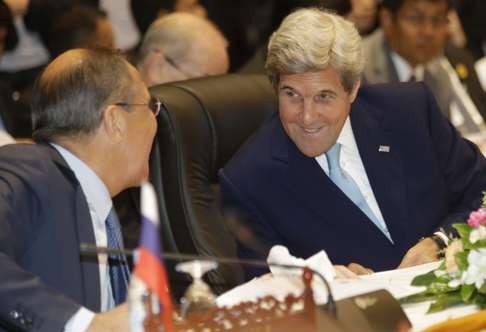Time to turn new page on South China Sea, says John Kerry
US secretary of state pledges to encourage Philippines to resume talks with China over maritime disputes

US Secretary of State John Kerry said on Tuesday it was time to “move away from public tensions and turn the page” over South China Sea disputes, pledging he would encourage the Philippines to resume talks with China.
Kerry’s comments in the Laotian capital Vientiane followed China’s joint statement with the Association of Southeast Asian Nations (Asean) on Monday over their maritime territorial disputes. The China-Asean statement signalled the major players’ attempts to ease months of confrontation surrounding the ruling, largely against China’s claims, by the Permanent Court of Arbitration in The Hague on July 12.
Analysts said it would still take much effort from all parties to rebuild trust and explore common ground before meaningful negotiations could take place.
At their meeting on Monday, Foreign Minister Wang Yi told Kerry that China hoped “the US would take steps to support resumed talks between China and the Philippines, and support efforts by China and Asean to maintain regional peace and stability”, according to a foreign ministry statement released on Tuesday.
Kerry said Beijing and Manila had indicated their willingness to engage in talks after the ruling was delivered, and that he would encourage new Philippine President Rodrigo Duterte when they meet in Manila today to engage in dialogue and negotiations with China to resolve the disputes.
“Hopefully this can become a moment that we can all take advantage of, where we work out some of the modalities of how do you deal with the fishing? How do you deal with natural resources? How do you deal with the free movement of vessels and protect the rights of everybody?” Kerry said.
“This could be a very important moment of shifting how this discussion is taking place and not being played out through public moves unilaterally and challenges, but in a constructive and thoughtful, engaged diplomatic manner.”
Echoing Wang, Kerry said the US also agreed to “move away from public tension” and to “turn the page” following the international tribunal’s ruling and to resolve disputes through peaceful and diplomatic means.
The US did not take a position on the disputes, Kerry said, but believed “the rule of law must be upheld”.
China has said it would ignore the tribunal ruling, which it deemed illegitimate.
A senior US government official said National Security Adviser Susan Rice told Chinese officials on Monday that countries should work to reduce tension in the South China Sea, but that the US would continue to carry out military operations there that have angered Beijing.
Xu Liping, senior researcher of Southeast Asia studies at the Chinese Academy of Social Sciences, said the Asean foreign ministers’ meeting “might be the starting point of the de-escalation of the South China Sea issue”.
The next point was to rebuild mutual trust through talks, he suggested.
Common ground for any effective negotiation to be based on is still lacking
Yet whether to start the negotiation based on the result of the arbitration ruling would be the biggest obstacle in the way of any future talks between Manila and Beijing, according to Xie Yanmei, senior China analyst at the International Crisis Group.
“Common ground for any effective negotiation to be based on is still lacking,” Xie said, though China was not likely to reclaim land at Scarborough Shoal contested by the Philippines soon, he added.
“China will not do anything to raise tension, especially ahead of this year’s G20 meeting that it will host,” Xie said.
Zhang Mingliang, associate professor at Jinan University in Guangzhou, said Duterte’s popularity may allow him some flexibility in negotiations, but the upcoming election in Malaysia and rising nationalism in Indonesia and Vietnam left them little space to step back.
Vietnam’s deputy foreign minister Le Hoai Trung said his country aimed to settle its territorial dispute with China in the South China Sea through bilateral talks but did not rule out applying international law. “For us, all means of peaceful settlement are important. All means. So You can count [international arbitration as a means] but we attach importance to bilateral negotiations,” he said.
Additional reporting by Associated Press
